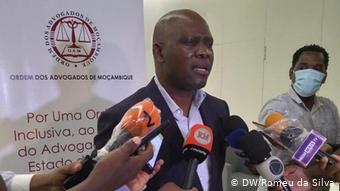Mozambique: Minister warns against arrogance among health workers - Watch
Controversial subsidies in Mozambique: “No new rights have been approved” – DW

File photo: DW
- Renamo deputy António Muchanga downplays the parliamentary officials “perks” controversy and harshly criticises Adriano Nuvunga, coordinator of the civil society petition against the new statute.
The Mozambican parliament did not create new perks for parliamentary officials and agents, the rapporteur of the Parliamentary Commission for Public Administration and Local Government (the 4th Commission) says. Rather, when approving the Law on the Statute for Parliamentary Officials and Agents, it only systematised rights they have enjoyed since 2009 and which are included in the Organic Law.
In an interview with DW Africa, the Mozambican National Resistance (Renamo) deputy questions the reasoning behind the petition against the approval, as well the figure of 100 million meticais destined for parliamentary employees announced by the Ministry of Finance, considering it exaggerated. Muchanga also criticised the director of the Centre for Democracy and Development (CDD), Adriano Nuvunga, who was at the forefront of the civil society petition.
DW Africa: What led you to hit the hammer in favour of the bill?
António Muchanga (AM): The acceptance that it is necessary to create a Parliamentary Employee Statute so that employees feel valued like the other members of the sovereign bodies, namely the officials of the Presidency, of the Council of Ministers and of the judiciary and of the magistracies of the Public Prosecution Service and the Courts. We [decided that we] would systematise the rights of the parliamentary officials and agents contained in the Organic Law and in the health and medication assistance decree. This is purely and simply what we did.
The only new thing we brought to the law was the seniority allowance [subsidio de diuturndade]. For whom? For those who have reached the top of their careers and who, for whatever reason, are asked to come to work in parliament, the Assembly of the Republic, [because] they are not allowed to apply [for a post]. In Mozambican law, the top of a career is Permanent Secretary. At the moment, we have no one in these conditions. What happened was that the Ministry of Finance went on to create a budgetary impact, on what basis we do not know, because the rights of parliamentary officials which are [now] being contested have been enjoyed since 2009.

AM: The Ministry of Finance has to show us what was the basis that it used to reach that figure.
DW Africa: And what was the maths made by Parliament?
AM: We didn’t do [the maths], because they [Ministry of Finance] said it was their job. But, from my experience, the budgetary impact cannot exceed [not] even 10 million meticais.
DW Africa: Why do parliamentary staff deserve different treatment from other civil servants? Especially since, for example, the national minimum wage has not been updated for more than a year, due to a lack of resources? This is the question that Mozambican society is asking.
AM: No new rights have been approved. I think it would be unwise today to come to Deutsche Welle and withdraw its rights because we have Covid-19, or because there is war in Cabo Delgado. Incidentally, the demonstration’s promoters themselves receive in US dollars. They never decreased the US dollars to support the personnel in Cabo Delgado, to support doctors who do not receive [their wages] in hospitals, to give food to HIV-Aids patients. The promoter [of the demonstration] receives more than US$7,000, plus his salary from the university. He never shared this with anyone, perhaps with the kids he persuaded to stop studying and get out on the street.
DW Africa: The people protest the approval of the benefits and civil society moved forward with a petition on Tuesday (11.05). How should this be dealt with in Parliament?

I believe that the Assembly will notify him and he will be allowed to present his concern, and it will assess whether the petition has merit. If there is merit, it will be considered. If it has no merit, we’ll move forward. What I felt yesterday is that they are against all statutes. They cannot be against the Statute of Parliamentary Officials and accept the Statute of the Judiciary, of the Justice Officers, of the Teachers. Including Non-Governmental Organisations: there are people here who we have to check, because effectively the people are starving here and the money they receive they do not receive in their name. They receive tax money from Europeans and North Americans to help the Mozambican people. Not to help them walk around here inciting disorder.
DW Africa: A debate was scheduled for Wednesday (12-05) to be followed by the final vote on the draft law on the Statute for Officials and Parliamentary Agents. Why was it postponed?
AM: It was postponed to allow for the petition to be analysed.













Leave a Reply
Be the First to Comment!
You must be logged in to post a comment.
You must be logged in to post a comment.